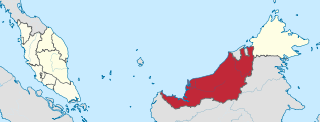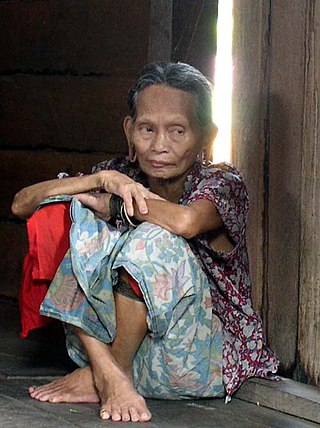Related Research Articles

Sarawak is a state of Malaysia. The largest among the 13 states, with an area almost equal to that of Peninsular Malaysia, Sarawak is located in East Malaysia in northwest Borneo, and is bordered by the Malaysian state of Sabah to the northeast, Kalimantan to the south, and Brunei in the north. The state capital, Kuching, is the largest city in Sarawak, the economic centre of the state, and the seat of the Sarawak state government. Other cities and towns in Sarawak include Miri, Sibu, and Bintulu. As of the 2020 Malaysia census, the population of Sarawak was 2.453 million. Sarawak has an equatorial climate with tropical rainforests and abundant animal and plant species. It has several prominent cave systems at Gunung Mulu National Park. Rajang River is the longest river in Malaysia; Bakun Dam, one of the largest dams in Southeast Asia, is located on one of its tributaries, the Balui River. Mount Murud is the highest point in the state. Sarawak is the only state of Malaysia with a Christian majority.

Miri is a coastal city in north-eastern Sarawak, Malaysia, located near the border of Brunei, on the island of Borneo. The city covers an area of 997.43 square kilometres (385.11 sq mi), located 798 kilometres (496 mi) northeast of Kuching and 329 kilometres (204 mi) southwest of Kota Kinabalu. Miri is the second largest city in Sarawak, with a population of 356,900 as of 2020. The city is also the capital of Miri District, Miri Division.

The Penan are a nomadic indigenous people living in Sarawak and Brunei, although there is only one small community in Brunei; among those in Brunei half have been converted to Islam, even if only superficially. Penan are one of the last such peoples remaining as hunters and gatherers. The Penan are noted for their practice of 'molong' which means never taking more than necessary. Most Penan were nomadic hunter-gatherers until the post-World War II missionaries settled many of the Penan, mainly in the Ulu-Baram district but also in the Limbang district. They eat plants, which are also used as medicines, and animals and use the hides, skin, fur, and other parts for clothing and shelter.
Guthrie Group Limited was a Singaporean-Malaysian company that primarily dealt with plantations. It merged with three other plantation groups to form the world's largest plantation company with the name of Sime Darby Berhad.

IOI Corporation Berhad, commonly referred to as IOI, was incorporated on 31 October 1969 as Industrial Oxygen Incorporated Sdn Bhd. IOI is one of Malaysia's biggest conglomerates. It ventured into oil palm plantations in 1983, followed by property development in 1984 and refineries in 1997. IOI was listed on the Kuala Lumpur Stock Exchange (KLSE) and trading as MYX: 1961—now known as Bursa Malaysia—in 1980.

Tambunan is the capital of the Tambunan District in the Interior Division of Sabah, Malaysia. Its population was estimated to be around 35,667 in 2010. It is located 80 kilometres east of the state capital, Kota Kinabalu, 48 kilometres south of Ranau and 48 kilometres north of Keningau. At an average altitude of 750 metres, this valley town, which is part of the Crocker Range, experiences a mild tropical climate all year long. The valley is peppered with terraced paddy fields and 70 villages. The dense forests of bamboo around Tambunan town are a legacy of the British colonial period, during which an edict stated that 20 bamboo sprouts had to be planted for every bamboo cut.

The ninth Sarawak state election was held on Saturday, 20 May 2006 with nomination day on Tuesday, 9 May 2006. The election functioned to elect 71 representatives to the Sarawak State Assembly. The eighth state assembly was dissolved by Yang di-Pertua Negeri Sarawak, Tun Abang Muhammad Salahuddin Abang Barieng by the advice of Chief Minister Abdul Taib Mahmud, on 24 April 2006.

Bintulu is a coastal town on the island of Borneo in the central region of Sarawak, Malaysia. Bintulu is located 610 kilometres northeast of Kuching, 216 kilometres northeast of Sibu, and 200 kilometres southwest of Miri. With a population of 114,058 as of 2010, Bintulu is the capital of the Bintulu District of the Bintulu Division of Sarawak, Malaysia.

Agriculture in Indonesia is one of the key sectors within the Indonesian economy. In the last 50 years, the sector's share in national gross domestic product has decreased considerably, due to the rise of industrialisation and service sector. Nevertheless, for the majority of Indonesian households, farming and plantation remains as a vital income generator. In 2013, the agricultural sector contributed 14.43% to national GDP, a slight decline from 2003's contribution which was 15.19%. In 2012, the agricultural sector provides jobs to approximately 49 million Indonesians, representing 41% of the country's total labor force.
Kulim (Malaysia) Berhad is a Malaysian company. Through its subsidiaries, it engages in oil palm plantation, investment holding, and property investment businesses in Malaysia. The company also manufactures rubber-based products, oleochemicals, and esters; produces oil palm clones by plant tissue culture technology; and distributes tropical fruits, as well as engaging in crude palm oil processing. The Corporate Office of Kulim (Malaysia) Berhad is located at Johor, Malaysia.

Palm oil, produced from the oil palm, is a basic source of income for many farmers in South East Asia, Central and West Africa, and Central America. It is locally used as cooking oil, exported for use in much commercial food and personal care products and is converted into biofuel. It produces up to 10 times more oil per unit area than soybeans, rapeseed or sunflowers.

Deforestation in Borneo has taken place on an industrial scale since the 1960s. Borneo, the third largest island in the world, divided between Indonesia, Malaysia and Brunei, was once covered by dense tropical and subtropical rainforests.

Kuala Lumpur Kepong Berhad (KLK) is a Malaysian multi-national company. The core business of the group is plantation. The company has plantations that cover more than 250,000 hectares in Malaysia and Indonesia. Since the 1990s, the company has diversified its business activities such as resource-based manufacturing, property development and retailing with worldwide presence. The company is listed on the Bursa Malaysia and is Malaysia's third-largest palm oil producer. KLK was ranked 1858th in the 2013 Forbes Global 2000 Leading Companies, with market cap of US$6.91 billion. In 2014, KLK was ranked 23rd most valuable Malaysia brand on the Malaysia 100 2014 with a brand value of US$364 million. The late Thong Yaw Hong, (former) secretary general of the Malaysian Treasury, sat on the board of KLK. Lee Oi Hian, the CEO of KLK, is or was chairman of the board of trustees of the Malaysian Palm Oil Council.

The Federal Land Development Authority is a Malaysian government agency that was founded to handle the resettlement of rural poor into newly developed areas and to organize smallholder farms growing cash crops.
Diospyros areolata is a tree in the family Ebenaceae. The specific epithet areolata means 'net-like', referring to the leaf veins.
TH Plantations Berhad is a Malaysian palm oil company. It was established in 1972. It has major activity in Indonesia. Its chairman is Yusof Basiran. There was fire on its land in 2013. It is owned at 73.83% by the government-run Tabung Haji (2016). A notable director is Dato' Noordin bin Md Noor, who has long-standing activity in politics.
Nucleus estate and smallholder (NES) is a farming system for commodity crops, often oil palm, practised in different world regions. It is most famous today for its application in the palm oil sector in Indonesia. The nucleus is the part of such a plantation that is under concession and management of the company, while another part of the plantation is operated by smallholders typically on their own land but planted by the company. NES farming is a particular form of contract farming.

The economy of Sarawak is the fourth-largest of the states of Malaysia, making up 9.3% of the Malaysian gross domestic product (GDP) in 2022. Meanwhile, Sarawak is home to 7.9% of the Malaysian population based on the 2020 census.
Indigenous rainforest blockades in Sarawak began during the late 1980s and 1990s. In response to deforestation and land conversion of Sarawak's forest landscapes, Indigenous people of several groups along with international activists organised blockades to resist logging activities and dam construction. Penan, Kayan and Kelabit people are among the groups who participated. Some blockades were dismantled by police and some participants were arrested. Indigenous people have continued to hold blockades into the 21st century.
References
- ↑ Bulan, Ramy; Majid Cooke, Fadzillah (2006). "Chapter Three Native Customary Land: The Trust as a Device for Land Development in Sarawak". State, Communities and Forests In Contemporary Borneo. ANU Press - Asia Pacific Monographs. ISBN 9781920942526. JSTOR j.ctt2jbjv2.11 . Retrieved 3 July 2022.
- ↑ "Sarawak Plantation Berhad". spb.listedcompany.com. Retrieved 2016-05-30.
- 1 2 3 4 5 6 Cramb, R.A. (2007). Land and Longhouse: Agrarian Transformation in the Uplands of Sarawak. NIAS. p. 409. ISBN 9788776940102 . Retrieved 2016-05-30.
- ↑ "Official website Ministry of Land Development Sarawak". mlds.sarawak.gov.my. Retrieved 2016-05-30.
- 1 2 Cooke, F.M. (2006). State, Communities and Forests in Contemporary Borneo. Australian National University. p. 51. ISBN 9781920942526 . Retrieved 2016-05-30.
- ↑ Weiss, M.L. (2014). Routledge Handbook of Contemporary Malaysia. Taylor & Francis. ISBN 9781317629580 . Retrieved 2016-05-30.
- ↑ Hew, C.S. (2003). Women Workers, Migration and Family in Sarawak. Taylor & Francis. p. 39. ISBN 9781135786335 . Retrieved 2016-05-30.